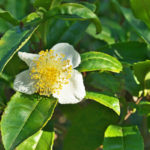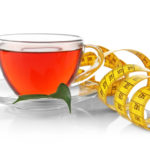by Michelle Sutton-Kerchner
The origins of tea are surrounded by myth and debate. However, one fact remains clear about this timeless beverage. It’s good for you …
From soothing a sour mood to a sour stomach—and sliming that stomach as well– tea is a healthful multitasker. As it steeps with its dainty swirls of steam, tea often is not associated with power. Sip some though and you will quench more than thirst.
Possible Cancer Fighter

Free radicals can cause cell damage that leads to health problems, including cancer. They occur naturally with aging as well as from lifestyle factors like smoking, excessive exposure to pollution and toxins, a diet high in fried foods, and alcohol consumption.
Tea leaves come from the Camellia Sinensis plant, which gives them their antioxidant properties. Antioxidants may help prevent damage caused by free radicals. More studies are required to precisely link drinking tea to a lower risk of cancer for some individuals. In the meantime, it is a good excuse to brew a mugful.
Weight Reducer
Catechins, a type of flavonoid found in tea, help increase metabolism. They assist the body in efficiently breaking down fats. Tea alone will not result in a smaller pants size. However, it can help shed a few pounds, especially when enjoyed in place of a pumpkin-spiced latte with whipped. Additionally, the energy-inducing caffeine content may be the catalyst that gets you off the couch and to your workout.

Studies involving green tea and oolong tea report them as top choices for weight loss. Both are very rich sources of catechins, and particularly seem to help shed belly fat. Avoid pairing them with tea-time favorites like scones and cookies, though. No matter how hot your brew, it won’t burn off a plate of calories. If you already lost weight, regular tea consumption can help maintain that loss by preventing the metabolism decline that commonly follows.
Heart Helper
Those amazing flavonoids found in tea also may lessen inflammation. This can help reduce plaque buildup inside artery walls, which lowers risk for cardiovascular disease. Tea also contains less caffeine than its sidekick, coffee. The reduced caffeine can make it the preferred antioxidant drink for those concerned with heart health.
Studies indicate drinking tea may improve vascular reactivity, a measure of how blood vessels perform during physical or emotional stress. (Some report the simple act of cradling its warm mug has an instant calming effect.) Evidence also links tea drinking to lower harmful LDL cholesterol levels. Lower blood pressure may be an additional benefit; however, more studies are needed to confirm this.

Several large, population-based studies showed a decreased risk of heart attack and stroke in those who regularly drank black or green tea. This could be the result of tea’s aforementioned properties. As population-based studies, other common factors could have contributed to participants’ reduced risk of heart attack and stroke, as well. One epidemiologist notes, “People who drink tea tend to be different than people who don’t drink tea.”
Perhaps its association with the herbal-yoga-natural-holistic-mindful lifestyle makes tea drinkers part of a synergistic health package. Just as stereotypically, coffee is associated with overly tired, stressed workaholics (including parents) who drink it down for the caffeine and/or sugar fix. As one popular-brand teabag label touts, “Be more tea.”
A Note on Herbal Tea
Herbal teas are not made from the Camellia Sinensis plant. They are not associated with the potential health perks of green, black, or oolong tea discussed here. They can contribute to a healthy lifestyle in their own way, separate from this topic.
Proper Tea

By “proper tea,” we are not referring to our ancestors who had elaborate rules for serving, sharing, and enjoying tea—complete with specific times of day and certain china. Instead, we are providing tips to optimize your next cup:
- Freshly brew your tea to capture the most antioxidants. Instant, decaf, and bottled teas often dilute the benefits, including with added sugar.
- To gain the healthiest perks from your cup, steep tea for three to five minutes.
- While the kettle is heating, take a few minutes to breathe mindfully and stretch. (Make it part of the tea experience. Be like the hearty “tea drinkers.”)
- As your tea steeps, take in its warmth and scent. Be grateful for your access to fresh water, the workers who cultivated the leaves, and the refreshment from a time-honored drink that overflows with goodness.
Sources
“Flavonoids: The Secret to Health Benefits of Drinking Black and Green Tea?” at www.health.harvard.edu.
Webmd.com
 Fitness & Wellness News Your Source for Fitness News, Wellness News, Health News, and Nutrition News!
Fitness & Wellness News Your Source for Fitness News, Wellness News, Health News, and Nutrition News!




